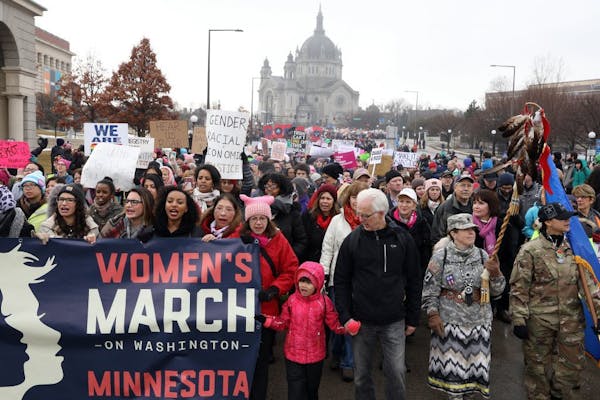Close to 100,000 protesters swept across the state Capitol grounds on Saturday in what was likely Minnesota's largest-ever demonstration of political dissent.
The turnout was the state's contribution to an emphatic nationwide day of protest aimed at protecting civil rights in the new era that began with the new Trump administration on Friday.
"We've come a long way, and we could lose it in a heartbeat," said Natalie Rahn, a 46-year-old Minneapolis resident.
Rahn, who uses a wheelchair because of her cerebral palsy, said she's terrified the Trump administration will be harmful to people with disabilities and the country's public education system. While initiated as a women's march, shared fears for many other civil rights protections shared center stage.
Police estimated the crowd at 90,000-100,000, and the turnout was so great that many of those in attendance couldn't get anywhere near the Capitol to listen to a series of speakers. The crowd was diverse — women and men, old and young, and a variety of ethnic groups. Many wore the pink hats that have become a nationwide symbol for anti-Trump demonstrators, and handwritten signboards carried messages of opposition to the new president's campaign rhetoric about women, immigrants and others.
The goal, a number of participants said, was to show Trump and others that they will not be reluctant to speak up if they feel his words or actions are harming the country.
"I feel like we've entered the dark ages," said Joy Miller, 62, of Plymouth. "There's so much negativity and I feel like we're going backwards."
Miller marched with her daughter and carried a sign reading: "A woman's place is in the resistance." She rode a bus into St. Paul for the march because, she said, she's unhappy with Trump's rhetoric and his Cabinet picks, and worried that the tenor of his campaign has "given permission to be mean to one another."
Speakers included a number of prominent DFL women holding elected office. They pledged to push for government policies that support women, immigrants, LGBT people and families.
State Rep. Peggy Flanagan of St. Louis Park urged the protesters to turn their sadness and anger into positive action and to stand up against policies they believe are hateful and discriminatory.
"No single election can break the movement we've built across generations and across decades," she said.
State Rep. Ilhan Omar, DFL-Minneapolis, called on demonstrators to find more ways to support people different from themselves. She thanked the men at the rally, saying progress toward gender equality requires their support.
"I hope to remind people that it is our differences that make our country beautiful," Omar said.
Some of the marchers turned out in groups. There were social workers and American Indian dancers, Planned Parenthood volunteers and a delegation representing the YWCA. A few youthful marchers carried signs about protecting their public schools.
Army veteran Lou Alvarado carried a U.S. flag. "I'm very proud of Minnesota today," said Alvarado, who was part of a larger group of veterans at the rally.
Kathleen Mickelson, 57, of Roseville, marching with her husband, James, said they were protesting not just for themselves, but for their daughter, granddaughter, daughter-in-law and many others who couldn't make it Saturday.
"Our most important job is to be active citizens," she said.
The event led to traffic snarls, with traffic so heavy in the morning that cars were backed up for a mile at St. Paul exits off Interstate 94. But it was largely peaceful, with organizers working beforehand with St. Paul police to ensure an orderly event.
Police said they arrested one counter-protester. Witnesses said he shouted his opposition to the protest and shot pepper spray into the crowd.
Staff writer Liz Sawyer contributed to this report.
erin.golden@startribune.com 612-673-4790
aimee.blanchette@startribune.com 612-673-1715

Marijuana's path to legality in Minnesota: A timeline

Minnesota to close state park on Iron Range, turn it back into a mine
U.S. Steel won't get exception to pollution rules that protect wild rice, MPCA says

Taste of Minnesota to be enjoyed on the ground and in the air this year

